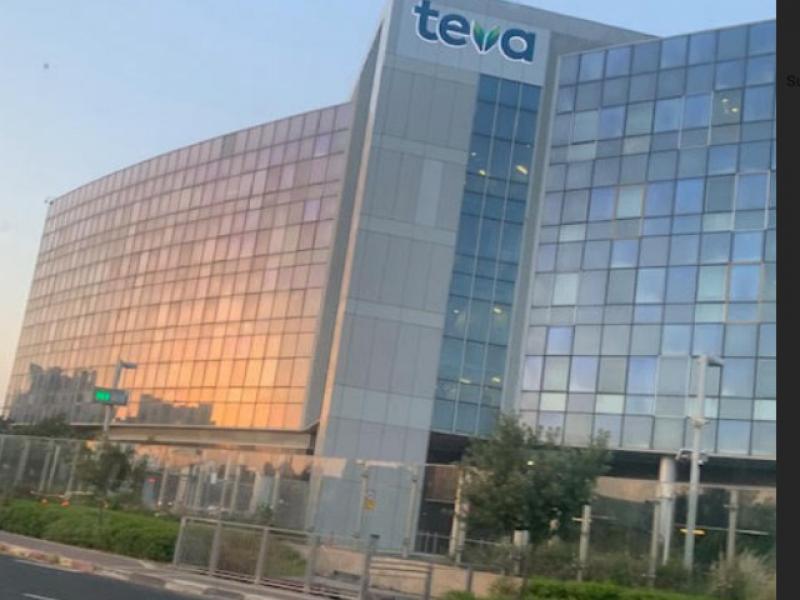
Teva, considered for years the "people's stock" and the flagship of the Israeli economy, and has become the most battered house-hold company, has returned to being the largest company in terms of market value.
On Sunday, Teva signed a market value of NIS 46.8 billion, up 3.4% during the day. In doing so, the Israeli pharmaceutical company bypassed those who rejected it from the summit - the IFF flavoring giant that began trading in Tel Aviv after merging Frutarom into it.
IFF closed trading day at NIS 45.8 billion yesterday, after falling 3%, while Teva continued to rise, adding 1.6% to NIS 47.5 billion, retaining first place. Just to put an ear to it, IFF, which ousted Teva, as mentioned, has lost 18% of its value in the past 12 months, while the Israeli pharmaceutical company added 43% of its value over the same period. Teva's surge, which added more than 70% to its March 19 valuation, received a backlash from the Corona crisis, while bank shares, which also bypassed Teva's market value, plunged sharply because of the plague.
According to the first quarter reports, after two and a half years in the Schultz role, it appears that investors are expecting growth. Expenses rose almost 10% compared to the corresponding quarter, and above expectations, to $ 4.5 billion. , Which is expected to show a growth rate that will dampen copaxone; the operating margin was 28.5%, compared to 24.6% in the same quarter; free cash flow increased by nearly $ 200 million to $ 550 million; and net financial debt fell by more than 2 A billion, to $ 24.3 billion, a figure that continues to threaten nature.
"We said 2019 would be the Depression year, and we do indeed see that we have passed the subway," Schultz said in the release of the first quarter reports in May. The Copaxone will continue to erode in the coming years, but the decline will be balanced by Ostado and Ajobi that will grow faster than the Copaxone decline. This trend will intensify in the coming years, so it is enough that all other generics will remain stable so we can show growth. "
On June 1, Teva received a recommendation from SunTrust from "Hold" to "Buy" recommendation, with the target price per share rising from $ 11 to $ 16 - 22% more than the share price on the market that day.
For many years, Teva was the largest company in terms of market value in Tel Aviv, when in August 2015 it traded at a record value of NIS 242 billion. It lost its premiere on May 12, 2019, when one day its share collapsed to 11%, partly as a result of a lawsuit filed against it in the US accused of leading coordination and price inflation of generic drugs for years. Of investors whose legal troubles, which did not amount to this claim alone, would rise to the nature with billions of dollars and even tens of billions in damages and compensation.
Such sums could overwhelm Teva completely, as she suffered a sustained decline in sales of her flagship drug - Copaxone, for the treatment of MS - at the time, and carried a net financial debt of $ 26.7 billion, which was largely created as a result of the failed acquisition of Octavis for about 40 Billion dollars. This deal, which was led by former CEO Erez Vigodman and completed in August 2016, did nothing to nature and even led it to make more than $ 6 billion in write-offs.
Those who were required to address these issues were CEO Cor Schultz, who took office in November 2017 and launched a streamlining plan that included organizational changes in nature; closing and selling plants as part of a new business focus; This is to reduce costs, reduce huge debt and return Teva back to growth.
Since the beginning of the year, Teva's share in Tel Aviv has risen by 26%, showing surplus performance on TA-35 and TA-Biomed indices and the largest Israeli competitor - Perrigo. Schultz deserves credit for the moves he has driven in the wild, but an even greater weight must be attributed to the world-wide Corona crisis, which has turned drug companies' stocks into defensive stocks, because it is essentially a health crisis.
Articles Archive
Top Categories
ABOUT IFI TODAY

Lorem ipsum dolor sit amet, consectetur adipisicing elit, sed do eiusmod tempor incididunt ut labore et dolore magna aliqua. Ut enim ad minim veniam, quis nostrud exercitation ullamco laboris nisi ut aliquip ex ea commodo consequat. Duis aute irure dolor in reprehenderit in voluptate velit esse cillum


Comments